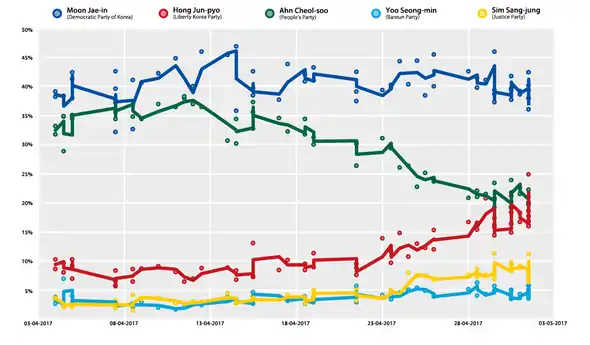2017 South Korean presidential election
Presidential elections were held in South Korea on 9 May 2017 following the impeachment and dismissal of Park Geun-hye.[1] The elections were conducted in a single round, on a first-past-the-post basis, and had originally been scheduled for 20 December 2017. However, they were brought forward after the decision of the Constitutional Court on 10 March 2017 to uphold the National Assembly's impeachment of Park. Following procedures set out in the Constitution of South Korea, Prime Minister Hwang Kyo-ahn succeeded Park as the acting president. After Park was removed from office by the Constitutional Court's ruling, acting president Hwang announced he would not run for a term in his own right.[2][3][4]
| |||||||||||||||||||||
| Turnout | 77.2% | ||||||||||||||||||||
|---|---|---|---|---|---|---|---|---|---|---|---|---|---|---|---|---|---|---|---|---|---|
| |||||||||||||||||||||
.svg.png.webp) Results by province and city ■ – Moon Jae-in ■ – Hong Jun-pyo | |||||||||||||||||||||
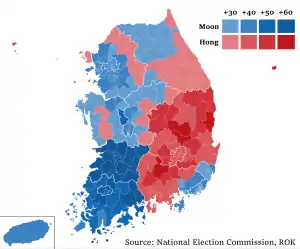 Results by district, city, or county | |||||||||||||||||||||
| |||||||||||||||||||||
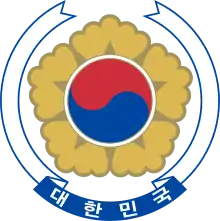 |
|---|
| This article is part of a series on the politics and government of the Republic of Korea |
|
|
| Wikinews has related news: |
Opinion polling before April consistently placed the Democratic Party's candidate, Moon Jae-in, runner-up in the 2012 election, as the front-runner. Second place in the opinion polls was initially held by former UN Secretary-General Ban Ki-moon, who declined to run in February, followed by Ahn Hee-jung, whilst he lost the Democratic primaries to Moon. Support for People's Party founder Ahn Cheol-soo then surged, threatening Moon's lead in the polls throughout early April, before descending to approximately equal that of Liberty Korea Party's candidate, Hong Jun-pyo, in final polls.
Moon won the election with 41 percent of the vote, defeating his nearest opponent, Hong, by a nearly 2-to-1 margin. Under the Constitution of South Korea, if a president dies, resigns, or is removed by impeachment, a new election must take place within 60 days. As a result, unlike previous presidential elections, president-elect Moon took office immediately upon the confirmation of the result by the National Election Commission, with the inauguration at the National Assembly on the same day.
Background
Park Geun-hye of the conservative Saenuri Party (renamed just prior to the election in February 2017 as the Liberty Korea Party) won the previous presidential election in 2012, succeeding Lee Myung-bak of the same party.
The Saenuri Party lost the parliamentary election in April 2016, with opposition parties including liberal Democratic Party of Korea and People's Party winning a majority in the National Assembly. Commentators described the result as leaving Park a lame duck president, as she may not run again under South Korea's one-term presidency rule.[5][6][7] and the Nikkei Asian Review noted that, in the wake of her "crushing defeat", "rivals sense a prime opportunity to complete the power shift in the December 2017 presidential vote".[5] The Korea Times stated: "The drama of deals and power struggles for next year's election has already begun."[8]
Impeachment of President Park Geun-hye
On 9 December 2016, President Park was impeached by the National Assembly by a vote of 234 for and 56 against (with seven invalid votes and two abstentions) after her implication in the 2016 South Korean political scandal. The Constitutional Court reviewed the motion of impeachment.
On 10 March 2017, Park was formally removed from office, with a unanimous ruling by all eight of the Constitutional Court's justices supporting her impeachment. A presidential election would have to be held within 60 days. In the interim, Prime Minister Hwang Kyo-ahn succeeded Park and served out the remainder of the 18th term until election day.[9]
The presidential election had previously been scheduled for 20 December, with Park barred from running due to the constitutional ban on any sort of presidential reelection. However, with Park's removal from office, the elections were brought forward to 8 May in order to ensure that a new president would be able to take office within 60 days of Park's removal, as required by the Constitution.
Registered candidates
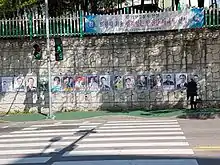
The six parties represented in the National Assembly are the social liberal Democratic Party of Korea, the conservative Liberty Korea Party, the centrist People's Party, the center-right Bareun Party, the progressive Justice Party, and pro-Park Geun-hye conservative Saenuri Party.
Ballot numbers for party candidates were given according to the candidate's party seat distribution in the National Assembly. Ballot numbers for independent and minor party candidates were determined through a random lottery by the National Election Commission.
A record number of 15 candidates registered, out of which two withdrew before election day.
| 1 | 2 | 3 | 4 | 5 | 6 | 7 | 8 | 9 | 10 | 11 (withdrew) | 12 | 13 (withdrew) | 14 | 15 |
| Moon Jae-in |
Hong Jun-pyo |
Ahn Cheol-soo |
Yoo Seung-min |
Sim Sang-jung |
Cho Won-jin |
Oh Young-guk |
Chang Sŏng-min |
Lee Jae-oh |
Kim Seon-dong | Nam Jae-jun |
Lee Kyung-hee |
Kim Jung-son |
Yoon Hong-sik |
Kim Min-chan |
| Democratic | Liberty Korea | People's | Bareun | Justice | Saenuri | Economic Patriots | Grand National United | Evergreen Korea | People's United | United Korea | Korean Nationalist | Future Korea Peninsula | Hongik | Independent |
Nominations
Candidate
|
| |||||||||||||||||||||||||||||
| Moon Jae-in | |||||||||||||||||||||||||||||
|---|---|---|---|---|---|---|---|---|---|---|---|---|---|---|---|---|---|---|---|---|---|---|---|---|---|---|---|---|---|
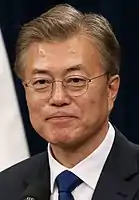 | |||||||||||||||||||||||||||||
| Leader of the Democratic Party of Korea (2015–2016) | |||||||||||||||||||||||||||||
Primary
Candidates were determined by an open primary of citizens who registered as a voter between February 15 to March 9, and March 12 to March 21. Overall, 2,144,840 people registered as a primary voter, making the 2017 primary the largest in Korean history.[10][11]
The primary was conducted from March 22 to April 3, with the voting base divided by four regions: Honam, Yeongnam, Hoseo and Seoul Capital Area, Gangwon Province, and Jeju Province as a single region. 71.6% of the registered voters voted in the primary, putting the vote total at 1,642,640.[11][12]
Candidates were:
- Moon Jae-in, former party chairman (2015–16), member of the National Assembly for Busan Sasang District (2012–16), 2012 Democratic United Party presidential nominee[8][13]
- Ahn Hee-jung, Governor of South Chungcheong Province (2010–2018)
- Choi Sung, Mayor of Goyang (2010–present), former member of the National Assembly for Goyang (2004–08)[15]
- Lee Jae-myung, Mayor of Seongnam (2010–present)[16]
| Polling firm/Link | Fieldwork date | Sample size |
Lee Jae-myung | Moon Jae-in | Ahn Hee-jung | Kim Boo-kyum | Park Won-soon | Kim Jong-in | Choi Sung |
|---|---|---|---|---|---|---|---|---|---|
| Democratic | Democratic | Democratic | Democratic | Democratic | Democratic | Democratic | |||
| Realmeter | 17.03.10 | 374 | 21.9% | 52.7% | 22.5% | – | – | – | 0.4% |
| R&Search | 17.02.27–17.02.28 | 1,111 | 15.5% | 38.0% | 29.8% | – | – | – | 0.2% |
| Korea Research | 17.02.05–17.02.06 | 2,016 | 8.8% | 36.9% | 26.2% | 2.4% | – | – | – |
| Realmeter | 17.02.01 | 528 | 13.9% | 31.4% | 23.7% | 4.1% | – | 3.7% | 0.5% |
| Realmeter | 17.01.16–17.01.17 | 1,004 | 13.5% | 32.8% | 10.8% | 5.6% | 5.3% | 5% | 1.1% |
Results
| Candidate | Place | Votes | Percentage |
| Moon Jae-in | Nominated | 936,419 | 57.0% |
| Ahn Hee-jung | 2nd | 353,631 | 21.5% |
| Lee Jae-myung | 3rd | 347,647 | 21.2% |
| Choi Sung | 4th | 4,943 | 0.3% |
| 1,642,677 | 100% | ||
Candidate
|
| |||||||||||||||||||||||||||||
| Hong Jun-pyo | |||||||||||||||||||||||||||||
|---|---|---|---|---|---|---|---|---|---|---|---|---|---|---|---|---|---|---|---|---|---|---|---|---|---|---|---|---|---|
.jpg.webp) | |||||||||||||||||||||||||||||
| Governor of South Gyeongsang Province (2012–2017) | |||||||||||||||||||||||||||||
Primary
Candidate was determined by a combination of opinion polls, conducted between March 30 to March 31 (50%), and the votes cast by the delegates at the party convention held on March 31 (50%). Candidates were:
- Lee In-je, member of the National Assembly (1988–2016)[17]
- Hong Jun-pyo, incumbent governor of South Gyeongsang Province (2012–present)[18]
- Kim Kwan-yong, incumbent Governor of North Gyeongsang Province (2006–present)
- Kim Jin-tae, member of the National Assembly for Chuncheon (2012–present)
Results
| Candidate | Place | Opinion Polls | Delegate Votes | Aggregated Result |
| Hong Jun-pyo | Nominated | 46.7% | 62.9% | 54.15% |
| Kim Jin-tae | 2nd | 17.5% | 21.1% | 19.30% |
| Lee In-je | 3rd | 24.6% | 5.1% | 14.85% |
| Kim Kwan-yong | 4th | 11.2% | 12.2% | 11.70% |
| 100% | 100% | 100% | ||
Candidate
|
| |||||||||||||||||||||||||||||
| Ahn Cheol-soo | |||||||||||||||||||||||||||||
|---|---|---|---|---|---|---|---|---|---|---|---|---|---|---|---|---|---|---|---|---|---|---|---|---|---|---|---|---|---|
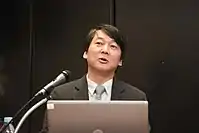 | |||||||||||||||||||||||||||||
| Leader of the People's Party (2016) | |||||||||||||||||||||||||||||
Primary
Candidate was chosen by an open primary (80%) and an opinion poll conducted between April 4 and 5 (20%). The primary was conducted through March 25 to April 4, with 7 regional primaries being held. Ahn Cheol-soo was declared winner of the primary on April 4.[19] The candidate were:
- Ahn Cheol-soo, former party co-chairman (2016), former co-chairman of the New Politics Alliance for Democracy (March–July 2014), withdrawn presidential candidate in 2012, founder of AhnLab, Inc., member of the National Assembly for Nowon District (2013–present)[5][8]
- Sohn Hak-kyu, former member of the National Assembly for Seongnam (2011–12), former Governor of Gyeonggi Province (2002–06), former assemblyman for Gwangmyeong (1993–98, 2000–02)[13][20]
- Park Joo-seon, deputy speaker of the National Assembly (2016–present), member of the National Assembly (2000–2004, 2008–present)
Results
| Candidate | Place | Votes | Percentage |
| Ahn Cheol-soo | Nominated | 133,927 | 72.71% |
| Sohn Hak-kyu | 2nd | 35,696 | 19.38% |
| Park Joo-seon | 3rd | 14,561 | 6.92% |
| 184,768 | 100% | ||
Candidate
|
| |||||||||||||||||||||||||||||
| Yoo Seong-min | |||||||||||||||||||||||||||||
|---|---|---|---|---|---|---|---|---|---|---|---|---|---|---|---|---|---|---|---|---|---|---|---|---|---|---|---|---|---|
.jpg.webp) | |||||||||||||||||||||||||||||
| Member of the National Assembly (2005– ) | |||||||||||||||||||||||||||||
Primary
Candidate was determined by a combination of votes from an evaluation commission based on 4 debates, held in different region of the country (40%), votes from the party members (30%), and public opinion polls (30%). Candidates were:
- Yoo Seong-min, member of the National Assembly for Daegu (2004–present)[21]
- Nam Kyung-pil, incumbent Governor of Gyeonggi Province (2014–present)
Yoo Seong-min was nominated as the candidate of Baerun Party on March 28.[22]
Results
| Candidate | Place | Votes | Percentage |
| Yoo Seung-min | Nominated | 36,593 | 62.9% |
| Nam Kyung-pil | 2nd | 21,625 | 37.1% |
| 58,218 | 100% | ||
Candidate
|
| |||||||||||||||||||||||||||||
| Sim Sang-jung | |||||||||||||||||||||||||||||
|---|---|---|---|---|---|---|---|---|---|---|---|---|---|---|---|---|---|---|---|---|---|---|---|---|---|---|---|---|---|
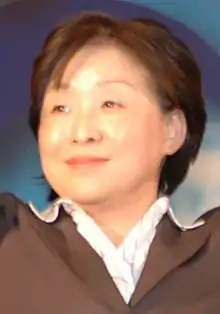 | |||||||||||||||||||||||||||||
| Leader of the Justice Party (2015– ) | |||||||||||||||||||||||||||||
Primary
Candidates were determined by a closed voting of the party members. Candidates were:
- Sim Sang-jung, Chairperson of the Justice Party (2015–present), member of the National Assembly for Goyang (2004– 2008, 2012–present) [23]
- Kang Sang-goo, vice president of the Justice Party education institute
Sim Sang-jung was nominated as the candidate of the Justice Party on February 16.[24]
Results
| Candidate | Place | Votes | Percentage |
| Sim Sang-jung | Nominated | 8,209 | 80.7% |
| Kang Sang-goo | 2nd | 1,962 | 19.3% |
| 10,239 | 100% | ||
Notable non-candidates
- Hwang Kyo-ahn, acting President (2016–2017), Prime Minister (2015–2017), former Minister of Justice (2013–15) announced that he would not be running for the presidency on 15 March 2017.[2]
- Kim Boo-kyum, member of the National Assembly for Daegu (2016–present), former member for Gunpo (2000–12),[5][13] announced that he would not be running for the presidency on 7 February 2017.[25]
- Ban Ki-moon, Secretary-General of the United Nations (2007–2016), was considering running as a non-partisan candidate but announced on 1 February 2017 that he would not be running for the presidency.[26][27][5][8]
- Park Won-soon, Mayor of Seoul (2011–present), announced that he would not be running for the presidency on 26 January 2017.[28]
- Oh Se-hoon, former Mayor of Seoul (2006–2011), announced that he would not be running for the presidency on 13 January 2017.[29]
- Kim Moo-sung, former Chairman of the Saenuri Party (2014–2016), announced that he would not be running for the presidency on 24 November 2016.[30]
Campaign
Official campaign
The official campaign begun on April 17 and ended on midnight of May 8.[31]
Debates
| South Korean Presidential Election, 2017 | ||||||||||||||
|---|---|---|---|---|---|---|---|---|---|---|---|---|---|---|
| Date | Organizers | Moderators | P Present I Invitee NI Non-invitee A Absent invitee | Notes | ||||||||||
| Sim Sang-jung | Moon Jae-in | Ahn Cheol-soo | Yoo Seung-min | Hong Jun-pyo | ||||||||||
| 14 April 10:00 KST |
SBS Journalists Association of Korea |
Kim Sung-joon | P | P | P | P | P | [32][33][34][35] | ||||||
| 19 April 22:00 KST |
KBS | Park Young-hwan | P | P | P | P | P | [35] | ||||||
| 23 April 20:00 KST |
NEC | Kim Jin-suk | P | P | P | P | P | [35] | ||||||
| 25 April 21:00 KST |
JTBC The Korean Political Science Association |
Sohn Suk-hee | P | P | P | P | P | [35] | ||||||
| 28 April 20:00 KST |
NEC | Park Yong-chan | P | P | P | P | P | [35] | ||||||
| 2 May 20:00 KST |
NEC | Lee Jung-hee | P | P | P | P | P | [35] | ||||||
| Candidate viewed as "most convincing" in each debate | ||||||||||||||
| Debate | Poll source | Sim Sang-jung | Moon Jae-in | Ahn Cheol-soo | Yoo Seong-min | Hong Jun-pyo | Notes | |||||||
| 14 April | Realmeter | 12.2% | 33.7% | 21.7% | 11.8% | 9.6% | [36] | |||||||
| JoonAng Ilbo | 13.1% | 22.3% | 16.5% | 25.0% | 5.4% | |||||||||
| Hankook Research | 15.1% | 21.2% | 16.2% | 28.1% | 7.5% | |||||||||
| 19 April | KSOI | 21.9% | 15.0% | 11.1% | 21.5% | 6.5% | ||||||||
| 23 April | JoonAng Ilbo | 22.0% | 17.4% | 9.0% | 23.7% | 6.7% | ||||||||
| Hankook Research | 27.2% | 12.6% | 5.1% | 22.1% | 5.9% | |||||||||
| 25 April | Hankook Research | 40.6% | 13.2% | 6.1% | 14.4% | 9.9% | ||||||||
| Gallup Korea | 30% | 18% | 6% | 14% | 9% | |||||||||
| 28 April | The Opinion | 35.8% | 13.5% | 5.9% | 14.6% | 11.5% | ||||||||
| JoongAng Ilbo | 38.1% | 11.5% | 4.5% | 16.6% | 10.0% | |||||||||
| Gallup Korea | 34.8% | 14.4% | 4.4% | 12.7% | 13.3% | |||||||||
| Research & Research | 41.8% | 9.3% | 4.0% | 18.4% | 9.9% | |||||||||
| Kantar | 40.4% | 11.8% | 3.9% | 19.2% | 11.0% | |||||||||
Opinion polling
Opinion polls throughout 2017 showed Moon Jae-in as the leading candidate. Polls prior to the conclusion of the Democratic primary (which included his rivals to the nomination) had Moon at around 30% support, and polls conducted after he had won the primary showed generally consistent results of around 40% by April.
Polling showed a significant decline in support for Ahn Cheol-soo during April. While at the beginning of the month he was polling close to Moon, and even exceeded him in a few polls, by May his support had dropped to around 20%. This decline coincided with rising support for Hong Jun-pyo. By the time of the polling blackout period began on 3 May, Ahn and Hong were recording similar levels of support.
| Polling firm/Link | Fieldwork date | Sample size |
Sim Sang-jung | Moon Jae-in | Ahn Cheol-soo | Yoo Seong-min | Hong Jun-pyo | |||||
|---|---|---|---|---|---|---|---|---|---|---|---|---|
| Justice | Democratic | People's | Bareun | Liberty Korea | ||||||||
| 17.05.09 | Election Day | |||||||||||
| 17.05.04- 17.05.05 | Early Voting | |||||||||||
| 17.05.03- 17.05.09 | Poll Blackout period | |||||||||||
| Embrain | 17.05.02 | 2,058 | 7.2% | 40.6% | 17.8% | 4.2% | 19.6% | |||||
| Research Plus | 17.05.01–17.05.02 | 1,011 | 5.6% | 39.7% | 18.9% | 4.6% | 13.7% | |||||
| Kantar | 17.05.01–17.05.02 | 1,147 | 6.8% | 38.5% | 15.7% | 3.8% | 16.8% | |||||
| Hankook Research | 17.05.01–17.05.02 | 1,000 | 11.2% | 38.0% | 21.0% | 4.0% | 16.8% | |||||
| JoWon C&I | 17.05.01–17.05.02 | 1,035 | 8.7% | 36.1% | 22.3% | 3.6% | 16.9% | |||||
| Research & Research | 17.05.01–17.05.02 | 1,058 | 8.1% | 40.2% | 19.9% | 5.7% | 17.7% | |||||
| Gallup Korea | 17.05.01–17.05.02 | 1,015 | 8% | 38% | 20% | 6% | 16% | |||||
| Yeouido | 17.05.01–17.05.02 | 2,182 | 6.4% | 39.4% | 20.1% | 4.5% | 24.9% | |||||
| Realmeter | 17.05.01–17.05.02 | 1,016 | 7.3% | 42.4% | 18.6% | 4.9% | 18.6% | |||||
| Hankook Research | 17.05.01–17.05.02 | 1,000 | 8.4% | 40.2% | 19.7% | 5.1% | 16.2% | |||||
| ResearchView | 17.04.30–17.05.02 | 2,053 | 8.0% | 43.2% | 21.1% | 4.8% | 20.1% | |||||
| MetriX | 17.04.30–17.05.02 | 1,500 | 9.1% | 39.2% | 21.5% | 4.3% | 16.7% | |||||
| Embrain | 17.05.01 | 1,018 | 9.0% | 38.6% | 22.6% | 3.7% | 18.3% | |||||
| JoWon C&I | 17.04.30–17.05.01 | 1,046 | 8.7% | 39.5% | 23.9% | 3.5% | 18.4% | |||||
| R&Search | 17.04.30–17.05.01 | 1,961 | 8.7% | 41.8% | 19.4% | 3.9% | 21.2% | |||||
| Research & Research | 17.04.30–17.05.01 | 1,027 | 9.8% | 39.7% | 20.2% | 5.1% | 16.4% | |||||
| JoongAng Ilbo | 17.04.30–17.05.01 | 2,000 | 9.2% | 39.3% | 21.8% | 4.9% | 16.5% | |||||
| Gallup Korea | 17.04.30–17.05.01 | 3,077 | 8.4% | 37.7% | 19.1% | 3.6% | 14.9% | |||||
| Polling firm/Link | Fieldwork date | Sample size |
Sim Sang-jung | Moon Jae-in | Ahn Cheol-soo | Yoo Seong-min | Hong Jun-pyo | |||||
|---|---|---|---|---|---|---|---|---|---|---|---|---|
| Justice | Democratic | People's | Bareun | Liberty Korea | ||||||||
| Research & Research | 17.04.29–17.04.30 | 1,004 | 8.1% | 39.4% | 20.8% | 4.8% | 16.2% | |||||
| Hankook Research | 17.04.29–17.04.30 | 1,000 | 11.4% | 38.7% | 23.4% | 5.7% | 14.4% | |||||
| The Opinion | 17.04.29–17.04.30 | 1,000 | 6.9% | 37.3% | 20.5% | 4.9% | 15.8% | |||||
| STI | 17.04.29–17.04.30 | 1,000 | 8.2% | 46.0% | 19.2% | 4.8% | 17.4% | |||||
| Ace Research | 17.04.29 | 1,023 | 7.6% | 41.1% | 21.5% | 4.3% | 20.8% | |||||
| MetriX | 17.04.28–17.04.29 | 1,000 | 7.2% | 39.8% | 21.0% | 4.1% | 15.4% | |||||
| KSOI | 17.04.28–17.04.29 | 1,000 | 8.6% | 41.4% | 22.1% | 6.3% | 16.6% | |||||
| Realmeter | 17.04.27–17.04.29 | 1,523 | 7.6% | 42.6% | 20.9% | 5.2% | 16.7% | |||||
| 17.04.28 | Fifth presidential debate held by NEC | |||||||||||
| Gallup Korea | 17.04.25–17.04.27 | 1,006 | 7% | 40% | 24% | 4% | 12% | |||||
| ResearchView | 17.04.25–17.04.27 | 1,418 | 6.8% | 45.5% | 23.7% | 3.9% | 15.3% | |||||
| Hankook Research | 17.04.25–17.04.26 | 2,000 | 7.5% | 38.5% | 25.2% | 4.9% | 12.3% | |||||
| Realmeter | 17.04.24–17.04.26 | 1,520 | 7.5% | 44.4% | 22.8% | 5.4% | 13.0% | |||||
| 17.04.25 | Fourth presidential debate held by JTBC | |||||||||||
| Hankook Research | 17.04.24–17.04.25 | 1,000 | 8.0% | 40.4% | 26.4% | 5.1% | 10.8% | |||||
| R&Search | 17.04.23–17.04.25 | 1,772 | 4.3% | 44.3% | 26.1% | 4.6% | 14.8% | |||||
| MetriX | 17.04.23–17.04.24 | 1,500 | 4.7% | 40.3% | 29.6% | 3.4% | 9.7% | |||||
| JoongAng Ilbo | 17.04.23–17.04.24 | 2,000 | 5.0% | 39.8% | 29.4% | 4.4% | 11.7% | |||||
| JoWon C&I | 17.04.22–17.04.24 | 1,010 | 3.8% | 39.4% | 31.1% | 4.2% | 13.9% | |||||
| 17.04.23 | Third presidential debate held by NEC | |||||||||||
| Kantar | 17.04.21–17.04.22 | 1,030 | 3.3% | 37.5% | 26.4% | 2.9% | 7.6% | |||||
| KSOI | 17.04.21–17.04.22 | 1,021 | 5.1% | 42.5% | 30.4% | 5.7% | 8.9% | |||||
| Research & Research | 17.04.21–17.04.22 | 1,514 | 4.1% | 39.1% | 30.1% | 3.8% | 9.5% | |||||
| ResearchView | 17.04.18–17.04.20 | 2,004 | 5.0% | 43.3% | 31.3% | 3.8% | 11.4% | |||||
| Gallup Korea | 17.04.18–17.04.20 | 1,004 | 4% | 41% | 30% | 3% | 9% | |||||
| 17.04.19 | Second presidential debate held on KBS | |||||||||||
| Research & Research | 17.04.18–17.04.19 | 1,009 | 4.7% | 40.0% | 30.1% | 2.5% | 10.2% | |||||
| EMBRAIN | 17.04.18–17.04.19 | 1,054 | 2.8% | 40.9% | 34.4% | 2.7% | 9.5% | |||||
| Hankook Research | 17.04.18–17.04.19 | 1,200 | 3.6% | 42.0% | 31.8% | 3.9% | 8.5% | |||||
| Realmeter | 17.04.17–17.04.18 | 1,012 | 4.2% | 43.8% | 32.3% | 3.2% | 10.2% | |||||
| EMBRAIN | 17.04.17 | 1,049 | 3.5% | 37.7% | 34.6% | 3.4% | 8.5% | |||||
| JoWon C&I | 17.04.15–17.04.16 | 1,063 | 3.2% | 39.7% | 32.8% | 4.7% | 13.1% | |||||
| JoongAng Ilbo | 17.04.15–17.04.16 | 2,000 | 3.7% | 38.5% | 37.3% | 3.9% | 7.4% | |||||
| Hankook Research | 17.04.15–17.04.16 | 1,000 | 3.9% | 42.6% | 35.6% | 2.7% | 7.3% | |||||
| Kantar | 17.04.14–17.04.15 | 1,039 | 2.8% | 35.8% | 30.2% | 2.8% | 8.4% | |||||
| KSOI | 17.04.14–17.04.15 | 1,015 | 2.9% | 46.9% | 34.4% | 3.4% | 6.8% | |||||
| Realmeter | 17.04.14 | 1,011 | 4.5% | 45.4% | 30.7% | 3.8% | 8.9% | |||||
| 17.04.13 | First presidential debate held on SBS | |||||||||||
| ResearchView | 17.04.12–17.04.13 | 1,253 | 3.0% | 46.0% | 36.5% | 2.4% | 8.8% | |||||
| Gallup Korea | 17.04.11–17.04.13 | 1,010 | 3% | 40% | 37% | 3% | 7% | |||||
| Hankook Research | 17.04.11–17.04.12 | 1,000 | 2.7% | 38.0% | 38.3% | 2.1% | 6.5% | |||||
| Realmeter | 17.04.10–17.04.12 | 1,525 | 2.8% | 44.8% | 36.5% | 1.7% | 8.1% | |||||
| R&Search | 17.04.09–17.04.11 | 1,997 | 3.6% | 42.3% | 37.0% | 2.0% | 9.1% | |||||
| JoWon C&I | 17.04.08–17.04.10 | 1,046 | 3.5% | 40.6% | 34.4% | 2.9% | 8.7% | |||||
| Realmeter | 17.04.08–17.04.09 | 1,018 | 4.2% | 41.1% | 34.8% | 2.2% | 8.6% | |||||
| Korea Research Center | 17.04.08–17.04.09 | 2,011 | 2.8% | 32.7% | 36.8% | 1.5% | 6.5% | |||||
| Realmeter | 17.04.07–17.04.08 | 2,244 | 3.3% | 42.6% | 37.2% | 2.4% | 8.4% | |||||
| Hankook Research | 17.04.07–17.04.08 | 1,000 | 3.6% | 37.7% | 37.0% | 3.0% | 6.7% | |||||
| Research & Research | 17.04.07–17.04.08 | 1,500 | 3.2% | 35.2% | 34.5% | 2.8% | 7.4% | |||||
| KSOI | 17.04.07–17.04.08 | 1,007 | 2.9% | 39.6% | 35.6% | 2.7% | 5.8% | |||||
| Kantar | 17.04.07–17.04.08 | 2,300 | 2.3% | 32.2% | 34.4% | 1.9% | 5.7% | |||||
| Research Plus | 17.04.07–17.04.08 | 1,023 | 2.0% | 37.7% | 37.7% | 2.1% | 6.6% | |||||
| Gallup Korea | 17.04.04–17.04.06 | 1,005 | 3% | 38% | 35% | 4% | 7% | |||||
| ResearchView | 17.04.04–17.04.06 | 1,012 | 2.2% | 42.4% | 35.1% | 2.5% | 10.3% | |||||
| Realmeter | 17.04.05 | 1,008 | 2.5% | 41.3% | 34.5% | 3.0% | 9.2% | |||||
| Surveymob | 17.04.04–17.04.05 | 1,048 | 2.74% | 34.83% | 28.91% | 6.95% | 8.09% | |||||
| JoongAng Ilbo | 17.04.04–17.04.05 | 1,500 | 2.1% | 38.4% | 34.9% | 2.7% | 9.6% | |||||
| EMBRAIN | 17.04.04 | 1,042 | 3.5% | 38.2% | 33.2% | 2.7% | 10.3% | |||||
| Hankook Research | 17.04.04 | 1,000 | 3.7% | 39.1% | 31.8% | 3.8% | 8.6% | |||||
| R&Search | 17.04.03–17.04.04 | 1,708 | 3.8% | 40.8% | 30.9% | 2.8% | 12.6% | |||||
| Polling firm/Link | Fieldwork date | Sample size |
Sim Sang-jung | Lee Jae-myung | Moon Jae-in | Ahn Hee-jung | Ahn Cheol-soo | Sohn Hak-kyu | Yoo Seong-min | Nam Kyung-pil | Hwang Kyo-ahn | Hong Jun-pyo |
|---|---|---|---|---|---|---|---|---|---|---|---|---|
| Justice | Democratic | Democratic | Democratic | People's | People's | Bareun | Bareun | Independent | Liberty | |||
| Realmeter | 17.03.27- 17.03.29 | 1,525 | 3.4% | 9.5% | 35.2% | 12.0% | 17.4% | 2.4% | 2.6% | – | – | 7.7% |
| R&Search | 17.03.27- 17.03.28 | 1,080 | 2.6% | 11.2% | 33.0% | 12.6% | 16.6% | 0.6% | 1.4% | 0.7% | – | 7.8% |
| Realmeter | 17.03.20- 17.03.24 | 2,553 | 2.9% | 10.2% | 34.4% | 17.1% | 12.6% | 2.2% | 2.2% | 1.0% | – | 9.5% |
| Gallup Korea | 17.03.21- 17.03.23 | 1,007 | 2% | 8% | 31% | 17% | 10% | 1% | 1% | – | – | 6% |
| R&Search | 17.03.19- 17.03.21 | 1,589 | 2.0% | 9.4% | 33.2% | 17.5% | 11.2% | 1.2% | 2.4% | 0.6% | – | 7.7% |
| Realmeter | 17.03.15 | 1,015 | 4.1% | 10.3% | 37.1% | 16.8% | 12.0% | 1.8% | 4.8% | 1.8% | – | 7.1% |
| Hankook Research | 17.03.14 | 1,000 | 1.1% | 8.9% | 30.7% | 13.3% | 8.9% | 0.9% | 1.4% | 0.7% | 9.6% | 2.2% |
| Realmeter | 17.03.10 | 1,008 | 3.3% | 9.7% | 36.0% | 14.5% | 11.3% | 2.6% | 2.4% | 1.0% | 10.1% | 2.4% |
| 17.03.10 | The Constitutional Court upholds the impeachment of President Park Geun-hye | |||||||||||
| Hankook Research | 17.03.06–17.03.07 | 1,000 | 1.3% | 8.4% | 30.7% | 13.7% | 7.6% | 1.2% | 1.2% | 0.6% | 11.1% | 1.8% |
| Realmeter | 17.02.27–17.03.03 | 2,025 | 1.7% | 8.9% | 36.4% | 12.6% | 10.8% | 2.9% | 2.8% | 1.3% | 14.9% | 3.8% |
| Polling firm/Link | Fieldwork date | Sample size |
Sim Sang-jung | Lee Jae-myung | Moon Jae-in | Ahn Hee-jung | Ahn Cheol-soo | Sohn Hak-kyu | Yoo Seong-min | Nam Kyung-pil | Ban Ki-moon | Hwang Kyo-ahn | Hong Jun-pyo |
|---|---|---|---|---|---|---|---|---|---|---|---|---|---|
| Justice | Democratic | Democratic | Democratic | People's | People's | Bareun | Bareun | Independent | Independent | Liberty | |||
| R&Search | 17.02.27–17.02.28 | 1,111 | 0.9% | 9.8% | 37.6% | 15.5% | 11.1% | 1.1% | 1.8% | 1.2% | – | 12.5% | 1.4% |
| Hankook Research | 17.02.24–17.02.25 | 1,000 | 1.1% | 10.1% | 30.9% | 15.8% | 7.8% | 0.8% | 1.6% | 0.1% | – | 10.3% | 1.6% |
| Gallup Korea | 17.02.21–17.02.23 | 1,006 | – | 8% | 32% | 21% | 8% | – | 2% | – | – | 8% | – |
| Realmeter | 17.02.20–17.02.22 | 1,508 | 1.1% | 10.1% | 32.4% | 19.2% | 10.5% | 1.7% | 3.3% | 1.8% | – | 11.6% | 3.3% |
| Realmeter | 17.02.13–17.02.15 | 1,515 | 2.5% | 7.0% | 32.7% | 19.3% | 8.6% | 2.8% | 3.9% | 1.3% | – | 16.5% | 1.3% |
| Realmeter | 17.02.06–17.02.08 | 1,508 | 2.6% | 8.2% | 33.2% | 15.7% | 9.1% | 3.1% | 3.5% | 1.6% | – | 15.9% | 1.4% |
| Hankook Research | 17.02.05–17.02.06 | 2,016 | 0.7% | 6.3% | 29.8% | 14.2% | 6.3% | 1.1% | 3.2% | 0.6% | – | 11.2% | – |
| Gallup Korea | 17.02.01–17.02.02 | 1,003 | 0.6% | 7% | 32% | 10% | 7% | 0.5% | 3% | – | 8% | 9% | – |
| Realmeter | 17.02.01 | 1,009 | 1.8% | 9.9% | 26.1% | 11.1% | 9.3% | 2.7% | 4.3% | 2% | – | 12.1% | 1.4% |
| Realmeter | 17.01.23–17.01.24 | 1,004 | 1.0% | 9.5% | 32.8% | 6.4% | 7.9% | 2.0% | 2.4% | 0.9% | 15.4% | 7.4% | – |
| Realmeter | 17.01.16–17.01.18 | 1,507 | 1.9% | 9% | 28.1% | 4% | 7.4% | 1.8% | 2.2% | 1.2% | 21.8% | 4% | 0.7% |
| Hankook Research | 17.01.15–17.01.16 | 1,000 | – | 9.5% | 31.4% | 3.9% | 4.8% | 1.3% | 1.2% | 0.3% | 20% | – | – |
| Gallup Korea | 17.01.10–17.01.12 | 1,007 | – | 12% | 31% | 6% | 7% | 2% | 3% | – | 20% | 5% | – |
| R&Search | 17.01.01–17.01.02 | 1,153 | – | 10% | 32.2% | 3.9% | 5.9% | 3.1% | 2.1% | 0.7% | 21.3% | 7.2% | – |
| Date | Polling firm | Ban Ki-Moon (Nonpartisan) |
Moon Jae-in (Minjoo) |
Ahn Cheol-so (People's) |
Kim Moo-sung (Saenuri) |
Undecided/ Refused |
Lead |
|---|---|---|---|---|---|---|---|
| 14–15 Nov 2016 | Realmeter | 31.5% | 32.7% | 22.8% | 13% | 1.2 | |
| 37.6% | 46.2% | 16.2% | 8.6 | ||||
| 37.2% | 39.9% | 22.9% | 2.7 | ||||
| 19–20 Sep 2016 | Realmeter | 38.5% | 30.6% | 18.0% | 12.9% | 7.9 | |
| 46.7% | 38.4% | 14.9% | 8.3 | ||||
| 46.3% | 32.5% | 21.2% | 13.8 | ||||
| 13–14 Jun 2016 | Realmeter | 36.5% | 34.9% | 19.0% | 9.6% | 1.6 | |
| 44.2% | 44.9% | 10.9% | 0.7 | ||||
| 40.9% | 33.7% | 25.4% | 7.2 | ||||
| 18–19 Apr 2016 | Realmeter | 42.3% | 42.8% | 14.9% | 0.5 | ||
| 41.0% | 32.3% | 26.7% | 8.7 | ||||
| 14–15 Mar 2016 | Realmeter | 44.0% | 45.0% | 11.0% | 1.0 | ||
| 37.2% | 44.2% | 18.6% | 7.0 | ||||
| 17–19 Feb 2016 | Realmeter | 44.3% | 45.0% | 10.7% | 0.7 | ||
| 37.7% | 43.8% | 18.5% | 6.1 |
Exit polls
KBS, MBC, and SBS Terrestrial Broadcasting Exit Survey
| Candidate | Estimated Percentage |
| Moon Jae-in | 41.4% |
| Hong Jun-pyo | 23.3% |
| Ahn Cheol-soo | 21.8% |
| Yoo Seung-min | 7.1% |
| Sim Sang-jung | 5.9% |
Results
Moon Jae-in of the Democratic Party of Korea won the plurality of the votes (41.08% in contrast to 24.03% won by his closest opponent Hong Jun-pyo), thus winning this election. He assumed the office as the President of South Korea immediately upon the confirmation of the results at 8:09 am on 10 May 2017 (Local time) and was inaugurated in the National Assembly at afternoon on the same day.[37]
Moon's 17.1% margin of victory is the largest percentage margin for any liberal candidate since the beginning of free and fair direct elections in 1987.
| Regions · Provinces · Cities |  |
.jpg.webp) |
.jpg.webp) |
.jpg.webp) |
 | ||||||
|---|---|---|---|---|---|---|---|---|---|---|---|
| Moon Jae-in Democratic |
Hong Jun-pyo Liberty Korea |
Ahn Cheol-soo People's |
Yoo Seung-min Bareun |
Sim Sang-jung Justice | |||||||
| Votes | % | Votes | % | Votes | % | Votes | % | Votes | % | ||
| Seoul National Capital Area | Seoul | 2,781,345 | 42.3 | 1,365,285 | 20.78 | 1,492,767 | 22.7 | 476,973 | 7.26 | 425,459 | 6.47 |
| Incheon | 747,090 | 41.2 | 379,191 | 20.9 | 428,888 | 23.7 | 118,691 | 6.54 | 129,925 | 7.16 | |
| Gyeonggi | 3,319,812 | 42.1 | 1,637,345 | 20.8 | 1,807,308 | 22.9 | 540,023 | 6.84 | 546,373 | 6.92 | |
| Gwandong (Gangwon) |
324,768 | 34.2 | 284,909 | 30.0 | 206,840 | 21.8 | 65,278 | 6.86 | 62,389 | 6.56 | |
| Hoseo (Chungcheong) |
Daejeon | 404,545 | 42.9 | 191,376 | 20.3 | 218,769 | 23.2 | 59,820 | 6.34 | 63,669 | 6.75 |
| North Chungcheong | 374,806 | 38.6 | 255,502 | 26.3 | 211,454 | 21.8 | 57,282 | 5.90 | 65,095 | 6.70 | |
| South Chungcheong | 476,661 | 38.6 | 306,614 | 24.8 | 290,216 | 23.5 | 68,521 | 5.55 | 83,868 | 6.79 | |
| Sejong | 77,767 | 51.1 | 23,211 | 15.2 | 32,010 | 21.0 | 9,192 | 6.03 | 9,353 | 6.14 | |
| Honam (Jeolla) |
Gwangju | 583,847 | 61.1 | 14,882 | 1.55 | 287,222 | 30.1 | 20,862 | 2.18 | 43,719 | 4.60 |
| North Jeolla | 778,747 | 64.8 | 40,231 | 3.34 | 285,467 | 23.8 | 60,802 | 2.56 | 29,296 | 4.93 | |
| South Jeolla | 737,921 | 59.9 | 30,221 | 2.45 | 378,179 | 30.7 | 25,819 | 2.09 | 49,509 | 4.01 | |
| Yeongnam (Gyeongsang) |
Busan | 872,127 | 38.7 | 720,484 | 32.0 | 378,907 | 16.8 | 162,480 | 7.21 | 94,329 | 4.85 |
| Ulsan | 282,794 | 38.1 | 203,602 | 27.5 | 128,520 | 17.3 | 60,289 | 8.13 | 62,187 | 8.38 | |
| Daegu | 342,620 | 21.8 | 714,205 | 45.4 | 235,757 | 15.0 | 198,459 | 12.60 | 74,440 | 4.72 | |
| North Gyeongsang | 369,726 | 21.7 | 827,237 | 48.6 | 253,905 | 14.9 | 149,017 | 8.75 | 88,080 | 5.17 | |
| South Gyeongsang | 779,731 | 36.7 | 790,491 | 37.2 | 284,272 | 13.4 | 142,479 | 6.71 | 113,051 | 5.32 | |
| Jeju | 169,493 | 45.5 | 68,063 | 18.3 | 77,861 | 20.9 | 22,784 | 6.11 | 31,716 | 8.51 | |
| Total | 13,423,800 | 41.08% | 7,852,849 | 24.03% | 6,998,342 | 21.41% | 2,208,771 | 6.76% | 2,017,458 | 6.17% | |
| Candidate | Party | Votes | % | ||
|---|---|---|---|---|---|
| Moon Jae-in | Democratic | 13,423,800 | 41.08 | ||
| Hong Joon-pyo | Liberty Korea | 7,852,849 | 24.03 | ||
| Ahn Cheol-soo | People's | 6,998,342 | 21.41 | ||
| Yoo Seong-min | Bareun | 2,208,771 | 6.76 | ||
| Sim Sang-jung | Justice | 2,017,458 | 6.17 | ||
| Cho Won-jin | Saenuri | 42,949 | 0.13 | ||
| Kim Min-chan | Independent | 33,990 | 0.10 | ||
| Kim Sun-dong | People's United | 27,229 | 0.08 | ||
| Chang Sŏng-min | Grand National United | 21,709 | 0.06 | ||
| Yoon Hong-sik | Hongik | 18,543 | 0.05 | ||
| Lee Kyung-hee | Korean Nationalist | 11,355 | 0.03 | ||
| Lee Jae-oh | Evergreen Korea | 9,140 | 0.02 | ||
| Oh Young-guk | Economic Patriots | 6,040 | 0.01 | ||
| Invalid/blank votes | 135,733 | – | |||
| Total | 32,807,908 | 100 | |||
| Registered voters/turnout | 42,479,710 | 77.23 | |||
| Source: National Election Commission | |||||
Maps
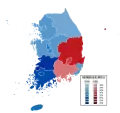 Results by vote share
Results by vote share
References
- McCurry, Justin (9 March 2017). "South Korean president Park Geun-hye forced from office by constitutional court". The Guardian. Retrieved 10 March 2017.
- "황교안 대선 불출마 선언" (in Korean). Kyunghyang Shinmun. 15 March 2017. Retrieved 15 March 2017.
- "PM not to run for presidency". koreatimes. 15 March 2017. Retrieved 17 May 2017.
- Sang-hun, Choe (15 March 2017). "South Korea to Elect New President in May, Government Says". The New York Times. ISSN 0362-4331. Retrieved 17 May 2017.
- Minegishi, Hiroshi (15 April 2016). "South Korean politicians jostle to succeed lamest of ducks". Nikkei Asian Review. Retrieved 17 April 2016.
- "Vote defeat for South Korea's Park raises 'lame duck' prospect". Reuters. 14 April 2016. Retrieved 17 April 2016.
- "Conservative rout leaves South Korea's Park Geun-hye a lame duck". The Australian. 14 April 2016. Retrieved 17 April 2016.
- Jun, Ji-hye (13 April 2016). "Attention to shift to 2017 presidential race". The Korea Times. Retrieved 17 April 2016.
- "PressTV-South Korean MPs vote to impeach president". Presstv.com. 9 December 2016. Retrieved 10 March 2017.
- "민주당 대선 후보 경선인단 200만 명 돌파". YTN. Naver. Retrieved 3 April 2017.
- "민주당 선거인단 214만명 마감…"정당사 전무후무한 일"". MoneyToday. Naver. Retrieved 3 April 2017.
- "[종합]민주당 최종 누적집계…文 57%> 安 21.5%> 李 21.2%". Newsis. Naver. Retrieved 3 April 2017.
- "Split voting could boost fate of People's Party". Korea JoongAng Daily. 12 April 2016. Retrieved 24 April 2016.
- 경기일보(Kyeonggi Daily News) (26 July 2016). "기사본문-최성 고양시장, 더민주 예비 후보 등록 대선 레이스 돌입 – 수도권 종합일간지 경기일보, 경기닷컴 – 정치, 경제, 사회, 문화, 스포츠, 연예, 포토, 경기TV, 뉴스, 기사 제공". Kyeonggi.com. Retrieved 10 March 2017.
- "이재명, 민주 예비후보 등록…YS·DJ 참배 후 광주行 : 네이버 뉴스" (in Korean). News.naver.com. 31 January 2017. Retrieved 10 March 2017.
- "경인일보 : 새누리당 이인제 前의원 "대선 출마"… 네번째 도전". Kyeongin.com. Retrieved 10 March 2017.
- "원유철 대선 출마 선언… 안상수도 출사표 채비 : 네이버 뉴스" (in Korean). News.naver.com. 3 February 2017. Retrieved 10 March 2017.
- "손학규·박주선, 安 경선 승리에 축하 "대선승리 위해 함께 하겠다"". EDaily. Naver. Retrieved 5 April 2017.
- 기사입력 2017.02.07 오후 6:26 최종수정 2017.02.07 오후 6:30. "손학규, 국민의당... :: 네이버 뉴스" (in Korean). M.news.naver.com. Retrieved 10 March 2017.
- "유승민, 대선 출마 공식 선언…'재벌 총수·공직자 부정부패 손본다' – 스페셜경제". Speconomy.com. Retrieved 10 March 2017.
- "유승민, 바른정당 대선후보로 선출…62.9% 득표(3보)". Yohnhap News Agency. Naver. Retrieved 29 March 2017.
- "심상정 첫 대선공약 "출산휴가 120일로 늘리겠다" : 네이버 뉴스" (in Korean). News.naver.com. 23 January 2017. Retrieved 10 March 2017.
- "심상정 대표 '승리의 V'". Yonhap News Agency. Naver. Retrieved 29 March 2017.
- "김부겸, 대선불출마 선언…"정권교체 밀알될 것" : 네이버 뉴스" (in Korean). News.naver.com. 7 February 2017. Retrieved 10 March 2017.
- "Ban Ki-moon rules out presidential run in South Korea – World – CBC News". Cbc.ca. 1 February 2017. Retrieved 10 March 2017.
- "Ban looms large in S. Korea's opinion polls". The Korea Herald. 29 September 2015. Retrieved 17 April 2016.
- "박원순, 대선 불출마 선언…"국민 마음 사지 못해" : 네이버 뉴스" (in Korean). News.naver.com. 26 January 2017. Retrieved 10 March 2017.
- "오세훈 전 서울시장 "대선 불출마하겠다" : 네이버 뉴스" (in Korean). News.naver.com. 13 January 2017. Retrieved 10 March 2017.
- "김무성 대선 불출마 선언…"보수의 썩은 환부 도려내겠다" : 네이버 뉴스" (in Korean). News.naver.com. 24 November 2016. Retrieved 10 March 2017.
- "공식 선거전 내일 시작…후보 15명 역대 최다". KBS. Naver. Retrieved 16 April 2017.
- The debate was recorded and broadcast as live at 10 pm KST on the same day on SBS.
- http://journalist.or.kr/news/article.html?no=41463
- "'TV토론 승자=차기 대통령'…TV토론, 선거 막판 변수로". News 1. Retrieved 14 April 2017 – via Naver.
- "대선 토론회 방송, 오늘부터 시작…일정과 주제는?". MBN. Retrieved 14 April 2017 – via Naver.
- "[리얼미터] TV토론 후 '문재인45% >안철수31% >홍준표9%'". Polinews. Retrieved 15 April 2017.
- "South Korea's Moon Jae-in sworn in vowing to address North". BBC News. 10 May 2017. Retrieved 17 May 2017.

.jpg.webp)
.png.webp)
